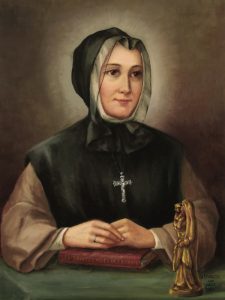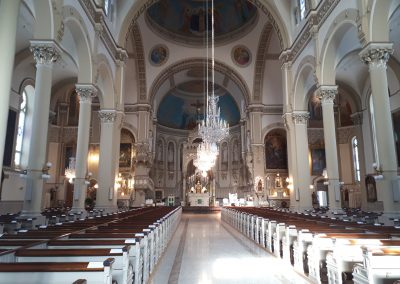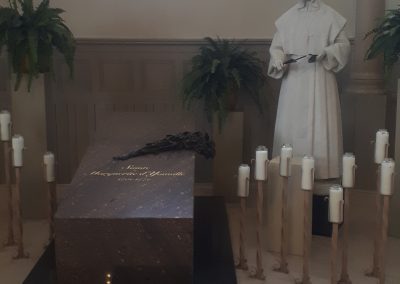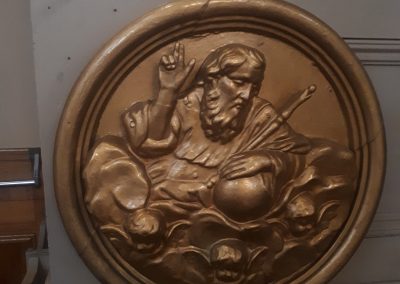Saint Marguerite d’Youville
 Birth:
Birth:
Marguerite is a descendant of Pierre Boucher, founder of Boucherville. She was born on October 15, 1701 in Varennes, Quebec. She was the first of six children. Her father was promoted to the rank of captain. This was the highest rank a soldier in the colonial troops could attain. He was promoted because of his fidelity to duty, his spirit of sacrifice. He died, however, when Marguerite was only 7 years old. From then on, the family suffered from poverty.
In 1712, in order to continue her studies, Marguerite was taken in a small boat to the boarding school of the Ursuline convent in Quebec City. After two years, her mother could no longer afford to leave Marguerite in Quebec City, even with the help of relatives and friends. She was forced to return to Varennes that same year to help out around the house and teach her brothers and sisters. Marguerite was a great help to her mother.
Difficult marriage :
At the age of almost 21, Marguerite married François d’Youville. The couple moved in with François’ mother, a greedy and domineering woman who made Marguerite’s life miserable. During her husband’s frequent absences, her mother-in-law was very unsympathetic towards her. But even worse, it soon became clear to Marguerite that Francis was indifferent, selfish and greedy; he was only interested in money! Meanwhile, she had no idea about her husband’s affairs, as he was away for long periods of time. In fact, he was engaged in the illicit liquor trade for Indian furs – he was even absent when their first child was born. But in spite of all these pains, Marguerite remained faithful to her duties of state, always treating François with respect, and granting him all sorts of delicate attentions. It was at this painful time, in 1727, that the holy woman received a special grace from God. She realized that God is a Father who is providentially responsible for all human beings and that all are brothers and sisters. All her life, Marguerite kept this thought in mind: “I leave everything to Divine Providence, my trust is in it; everything will happen in a way pleasing to God.”
Death of her husband:
Anxiety and grief continued to be an integral part of these years. Holding back her tears, Marguerite was left alone to care for her children. Three of her children died in childhood and she was pregnant with the sixth child when her husband became seriously ill. Marguerite was now a widow at the age of 29. Not only did she have to care for her two surviving sons, who would become priests, but she also had to pay off the enormous debts left by her husband.
More than a year later, her little baby died. But one day, Marguerite’s spiritual director, Father Dulescoat, said to her: “Be comforted my child, God has destined you for a great work and you will raise a house from its ruins! She did not know at the time that this work was the formation of the Institute of the Sisters of Charity, and that the house was the General Hospital, she simply continued to do the holy will of God for the time being…
Father Dulescoat, who will understand that she is a soul of choice, will say to her: “Console yourself my daughter, God destines you to a great work, and you will raise a house on its decline”.
Beginning of the foundation:
Nevertheless, Marguerite continued to visit the poor in the hospital and mend their clothes. She begged for money to bury the criminals who had been hanged in the market place.
In 1737, Marguerite took in a poor blind woman. Seeing Marguerite’s selfless care for the poor, three women joined her. They consecrated themselves to God, secretly promising to serve Jesus in his poor.
They were persecuted and contradicted. People threw stones at Madame d’Youville and her companions on their way to church! Their malice went even further when they heard rumors that Father Louis Normant, the superior of the Sulpicians – and Marguerite’s new spiritual director – wanted her and her companions to take over the General Hospital for the poor of Montreal, established in 1693 by the Charon brothers! But despite these persecutions, Mother d’Youville and her companions remained peaceful and continued to work with dedication and courage, finding their best support in prayer. It was when things seemed most desperate that Marguerite trusted God’s help the most, and felt his closeness to her the most.
Father Normant, their superior, had become dangerously ill. Marguerite solemnly promised that if Father Normant recovered, she would have a special painting made of the Eternal Father. Father Normant recovered – and since then, a beautiful painting of the Eternal Father has hung in the large community room of the Motherhouse in Montreal.
First fire:
On the night of January 31, 1745, a fire completely destroyed their home. It was devastating for the residents, but Marguerite promised not to abandon them. With unwavering confidence in Divine Providence, she decided to start over. As the fire raged, a group of onlookers were heard shouting, “Look at those purple flames! … These women are drunk!” (N.B. In French, the word “gris” is translated as “grey”, and it means not only the color, but also the fact of being drunk. So, from the day of the fire, people began calling the sisters “Grey Sisters,” which means “Drunken Sisters.” Out of humility, and to show that her sisters should be intoxicated by the love of God and neighbor, Marguerite kept this nickname for her community). People suspected her and her companions of making alcohol in their homes.
After the fire, Marguerite asked herself, “What can we learn from this? Maybe we were too well off. Now we will have to live poorer!” This resolution was carried out two days later, on February 2, 1745, when Marguerite, then 44 years old, and the other sisters, signed the “Initial Commitment.” Here is part of that founding document: … “for the greater glory of God … for the relief of the poor … we are united in pure charity to live and die together … to devote our time, our days, even our whole life, to work without reserve … to receive, feed and support as many poor people as we can care for…” And from that day on, each Grey Nun has signed her name to this commitment!
Her companions, some elderly people and an orphan followed her on foot. And at the same time, poor Marguerite had to endure the laughter of the people they passed. When Marguerite arrived at the hospital, she found that four elderly men and two elderly brothers were living there in deplorable conditions. After attending to their urgent needs, Marguerite’s creative ingenuity and the energetic activity of her sisters made the hospital livable. After only three years as director of the general hospital, Marguerite had completely renovated it.
She declared, “If God calls us to govern this house, his plan will succeed; the impediments and opposition of men must not trouble us.” She would also write, “Divine Providence is truly admirable. God has a way of comforting those who depend on Him, no matter what happens. I place all my trust in Him!”
They were now respected by the people and were seen as mothers and sisters to the poor, the elderly, the orphans, the prostitutes, the mentally ill, the physically handicapped, the chronically ill and the abandoned children. Their work was now recognized for what it was: a mission of charity and love. That same year, Mother d’Youville and her companions began their work as nurses during a chicken pox epidemic. The disease also spread to the Indian missions around Montreal. Not being cloistered nuns, Marguerite and her companions went into the homes and took care of the sick who could not be hospitalized.
Siege of Quebec :
In 1756, war is officially declared between France and England. The young but capable English general Wolfe arrived in June 1759 with a fleet carrying several thousand men, and dropped anchor in front of Quebec. He soon seized the city of Levis and the island of Orleans. He laid siege to the city of Quebec and took it in September. Then it was Montreal’s turn. From the beginning, the Grey Nuns had an extra job, taking care of the wounded on both sides, the widows and the orphans. Marguerite even helped some wounded English prisoners escape the wrath of the French-allied Indians! The situation in the Canadian colony is very difficult. All the able-bodied men are in the army; consequently, the fields are not cultivated and food is scarce. The sounds of guns mixed with cries of anger, frustration and grief could be heard day and night.
Her priest son was taken prisoner:
One of Mother d’Youville’s greatest consolations was that her two sons became priests. But during the siege of Quebec City, Father Charles, the youngest of Mother d’Youville’s sons, was imprisoned on an English ship with his parishioners. Marguerite feared for his safety. Four months later, at the surrender of Quebec, the prisoners were released unharmed. In 1763, the Catholic king of France officially ceded his colony of Canada to the Protestant king of England. Mother d’Youville shares with us her suffering. She writes: “To lose our king, our country, our possessions, and even worse: to fear the disappearance of our Holy Religion, all this is very difficult to bear! “Indeed, the British military regime then began, and soon harassed and persecuted the Catholic Religion and its clergy. It will take many years of struggle, diplomacy and persevering prayer to obtain religious freedom from the new masters. But this is another story… Many French and Canadian citizens returned to France rather than live under English rule. The little people, attached to a land they had worked for generations, stayed there, as well as some members of the nobility. Mother d’Youville found it difficult to say goodbye to her relatives, but for Marguerite there was no question of leaving. Never had the Grey Nuns been so numerous in need of them.
Second fire:
On May 18, 1765, a fire broke out that threatened to destroy the entire city of Montreal! Marguerite sent everyone she could to help control the fire. But tragically, the tide had turned and the General Hospital was completely destroyed! A few hours later, Marguerite stands before the smoking ruins; she gathers everyone around her and says, “We are going to recite the ‘Te Deum’ on our knees, to thank God for the cross he just sent us! God will reward her by promising that no fire will ever touch the general hospital again, and that is what happened. But the great stone walls were still standing, and Marguerite took it as a sign of God’s providence to find the painting of the Eternal Father unharmed among the ruins. A statue of Our Lady of Providence, before which she and her first companions had made their consecration, had also been preserved. Strengthened by these signs of God’s love, Marguerite, now 64 years old, began the reconstruction of the General Hospital with great communicative energy.
Not enough room for everyone:
Three years later, Marguerite would complain that there were not enough resources to accommodate all those in need. She wrote: “There are so many things we could do if only we had the means. Every day the poor who are in need come to us, and I weep bitterly at having to turn them away. If I knew how to get funds without stealing, I would have a new building, big enough to accommodate 200 people, but I have nothing! Nevertheless, I have to believe that God is pleased with our good intentions. His trust in God’s providence was rewarded one day when there was almost nothing left in the house: They found several barrels of fine wheat flour in their dining hall one morning. No one ever found out where they came from.
Death of Saint Marguerite :

The luminous cross seen in the sky at the time of the death of Saint Marguerite d’Youville
In the last years of her life, Mother d’Youville continued to correct the sisters and teach them the ways of God. She did not let any opportunity go by, knowing how important it was to see to it that the virtue of charity flowed in their veins, charity among themselves and also for the poor and the needy. But Marguerite could not live forever in this world – working day and night in the service of the poor, and the sisters in her care, her health could not hold out. In the fall of 1771, Marguerite’s health began to decline and in early December she suffered a stroke. When she later suffered another stroke and became paralyzed, she knew that her service to the poor would soon come to an end. She also knew that her last words would leave a permanent impression on those whose lives were intertwined with hers. To her spiritual daughters she bequeathed her great spirit of charity, recommending that they “remain faithful to the duties of the life they have embraced… and always follow the paths of regularity, obedience, mortification, but above all, the most perfect union must always reign among them.” On December 23, around 8:30 p.m., Mother d’Youville passed into the arms of God. She was 70 years old. At that very moment, a luminous cross appeared in the sky above the hospital. With astonishment, passers-by noticed this strange sight and considered it miraculous. One of them, named Jean Delisle, understood that Marguerite had just left this world and exclaimed, “Oh, what a cross for those poor Grey Nuns!”



